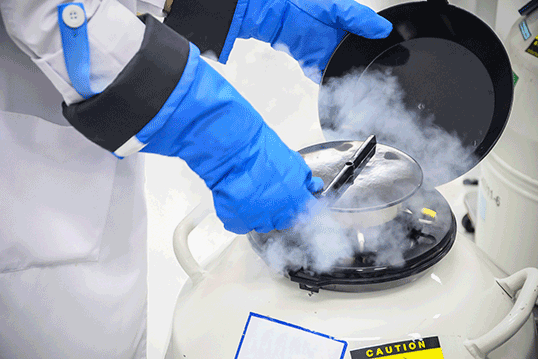
Reproductive Psychology

Infertility is not an uncommon condition. In fact, one in eight couples has trouble getting pregnant or sustaining a pregnancy. Approximately one-third of infertility is attributed to the female partner, one-third to the male partner and one-third to a combination of problems in both partners or is unexplained. Receiving a diagnosis of infertility can be devastating and create negative emotions including anxiety, depression, hopelessness and anger in both partners. Each partner may have different reactions and feelings, which makes it difficult to connect and support each other. Rather than experiencing the joy and excitement of planning to have a baby, couples with infertility confront intrusive and stressful medical procedures that cause financial burden and do not guarantee success. Feeling jealous that other couples can have a baby the “cheap, easy, fun way” is not uncommon. Infertility can also negatively affect sexual intimacy. What used to be a way of expressing love and connection gets associated with failure to conceive. In addition, fertility relates to social standards of masculinity and femininity, so infertility may lead to feeling damaged or inadequate as a partner. Men and women process the grief and loss that comes with a diagnosis infertility differently. During an infertility crisis, counseling can help a couple support each other and develop joint coping strategies.
Pregnancy Loss
About 15-20 percent of all women with a verified pregnancy may suffer a miscarriage. Miscarriage can create intense feelings of sadness and guilt, and often the emotional distress is greater than the physical distress. Talking to a psychologist can help to process grief and cope with the complicated mix of feelings that occurs following a miscarriage.


Postpartum and Antepartum Depression and Anxiety
Anxiety and depression are not uncommon during and after pregnancy. Symptoms may include irritation, anger, feeling disconnected, hopelessness, loss of appetite, bouts of crying, feeling a sense of dread and feeling overwhelmed. Don’t hesitate to get help. Counseling can provide emotional support, help with understanding symptoms and provide recovery coping skills.
Egg and Sperm Donor Screenings
Both my predoctoral and postdoctoral internships focused on psychological and neuropsychological assessment. Not all psychologists work in testing and assessment, but this has been an integral part of my practice for my entire career. I have received advanced training in using the Personality Assessment Inventory, focusing on sperm and egg donor screening. The purpose of psychological assessment of a gamete donor is to ensure he or she meets the guidelines for donation established by the American Society of Reproductive Medicine. For anonymous egg and sperm donor screenings, the client will participate in a clinical interview and complete the PAI. A report will be forwarded to the appropriate agency or clinic. If a donor is married or has a live-in partner, the spouse or partner will also be required to attend part of the meeting. Recommendations are based on emotional stability and maturity, psychological functioning and ability to provide informed consent. Screenings can be done in-person at my office or via HIPAA compliant Zoom.
If the donor is an acquaintance, friend or family member, an additional joint meeting between recipients, donor and the donor’s spouse or partner is required. In this meeting, we will discuss disclosure, disposition of unused embryos and decision-making authority.


Gestational Carrier Screenings
I have also received advanced training in using the PAI for gestational carrier screening. The purpose of psychological screening of gestational carriers is to ensure she meets the guidelines established by the American Society of Reproductive Medicine and to ensure the psychological well-being of both the potential carrier and the intended parents. During a screening, the potential carrier will participate in a clinical interview and complete the PAI. Her spouse or live-in partner will be required to attend the meeting and may also complete the PAI. If the potential carrier is a friend or family member, a joint meeting is required to ensure all participants agree on critical issues, such as the number of embryos transferred, termination and relationship between the parties. A report will be forwarded to the appropriate agency or clinic. Recommendations are based on emotional stability and maturity, understanding of the emotional aspects of the process, psychological functioning and ability to provide informed consent. Screenings can be done in-person at my office or via HIPAA compliant Zoom,
Consultation for Heterosexual Couples
Many reproductive endocrinologists require gamete recipients and intended parents to meet with a mental health professional skilled in reproductive psychology prior to their IVF cycle. You may ask yourself, “Why would my doctor send me to a psychologist? I am not crazy. I just want to have a baby!” There are a number of reasons why this is important. First, this is not an evaluation. It is not the same as the home visit during the adoption process. This one- to two-hour meeting is educational, and the topics covered include decisions about if, how and when you disclose about third party reproduction. We will also address some of the critical decision points along the way to ensure you and your partner agree with the family building plan. Additional topics include donor/surrogate selection, future contact with the donor and/or surrogate, decisions about remaining embryos and how to avoid common pitfalls of the process. Please feel free to bring any questions you have to this meeting. If you are using a known donor or carrier, an additional meeting with all parties is required to ensure everyone agrees with the plan and to address any potential differences.


Consultation for Same Sex Couples
Research has long shown that children raised by same sex couples do just as well as those raised by heterosexual couples. I wholeheartedly support LGBTQ+ family building. You may ask yourself, “Why would my doctor send me to a psychologist? I am not crazy. I just want to have a baby!” There are a number of reasons why this is important. First, this is not an evaluation. It is not the same as the home visit during the adoption process. This one- to two-hour meeting is educational, and the topics covered include decisions about if, how, and when you disclose about third party reproduction. We will also address some of the critical decision points along the way to ensure you and your partner agree with the family building plan. Additional topics include donor/surrogate selection, future contact with the donor and/or surrogate, decisions about embryo disposition and how to avoid common pitfalls of the process. Please feel free to bring any questions you have to this meeting. If you are using a known donor or carrier, an additional meeting with all parties is required to ensure everyone agrees with the plan and to address any potential differences.
Consultation for Single Men and Women
If you are a single woman and are choosing to build your family with a sperm donor, or you are a single man opting for a surrogate and egg donor, I wholeheartedly support your choice to have a family! You may ask yourself, “Why would my doctor send me to a psychologist? I am not crazy. I just want to have a baby!” There are a number of reasons why this is important. First, this is not an evaluation. It is not the same as the home visit during the adoption process. This one- to two-hour meeting is educational, and the topics covered include decisions about if, how and when you disclose about third party reproduction. We will also address some the critical decision points you may face along the way. Additional topics include donor/surrogate selection, future contact with the donor and/or surrogate, decisions about embryo disposition and how to avoid common pitfalls of the process. Please feel free to bring any questions you have to this meeting. If you are using a known donor or carrier, an additional meeting with all parties is required to ensure everyone agrees with the plan and to address any potential differences.


Fertility Consultations in Other Languages
I work closely with a Spanish speaking certified medical interpreter. If you need a Spanish interpreter during your fertility consultation, please let me know and we can arrange for her to join us. For other languages, please reach out to me.
If you are from China, I have worked with a Chinese interpreter, so this may also be possible. Please contact me.
Egg Freezing
Egg freezing, or oocyte cryopreservation, is a process in which a woman’s eggs are extracted, frozen and stored as to preserve reproductive potential in women of reproductive age. Choosing to freeze your eggs is an important decision, which has emotional implications. Talking to a psychologist can help you sort out your feelings and provide you with critical psychological information you need to make this decision.


Oncofertility
Ten percent of cancer patients are under the age of 40, and infertility as a result of cancer treatment affects more than 135,000 people in the United States each year. As cancer survivorship increases, the preservation of fertility becomes an important topic for patients and their families. The ability to preserve fertility prior to cancer treatment can provide hope at the time of diagnosis. However, receiving a cancer diagnosis and the news of potential infertility can be overwhelming. Often there is little time to decide about fertility preservation because of the critical need to begin cancer treatment as soon as possible. Talking with a psychologist about fertility preservation choices and the emotional impact of a cancer diagnosis can provide support and coping skills.

